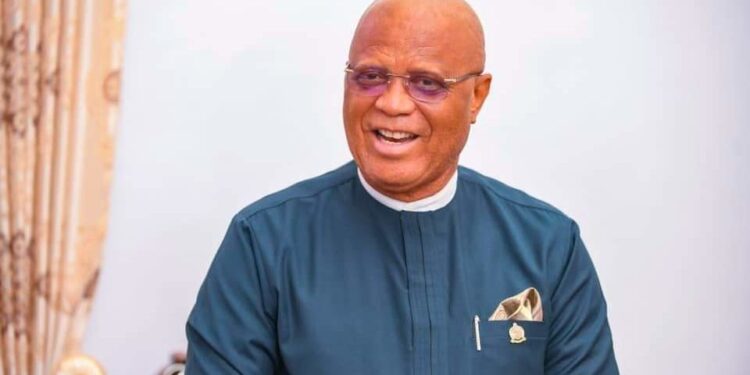Akwa Ibom State, once a beacon of hope and prosperity, has been ruthlessly plunged into darkness and despair under Governor Umo Eno’s tyrannical rule. Despite grand promises to uplift the people, Governor Eno has not only failed but actively sabotaged the lives of Akwa Ibom’s citizens. By withholding state funds and selectively rewarding his inner circle, he has engineered a cash crisis, thrusting the state into unrelenting hunger and poverty.
“The current situation in Akwa Ibom is dire. Governor Eno’s mismanagement and corruption have left the people in a state of despair,” says Mr. John Doe, a concerned citizen.
The state’s economy, once robust and thriving, lies in shambles. Employment opportunities have vanished, leaving the populace in a desperate struggle for survival. Education, the bedrock of future prosperity, has been decimated. Over 3000 schools languish in appalling conditions, while Governor Eno’s feeble attempt to renovate a mere 31 schools is a cruel mockery.
According to a recent report by Staticsense, Akwa Ibom is now considered the poorest state in South South Nigeria, highlighting the catastrophic governance under Governor Eno. “It is disheartening to see our state fall behind in terms of development and prosperity. Governor Eno’s priorities are clearly misplaced,” says Mrs. Jane Smith, a community leader.
Even more alarming is the climate of fear that Governor Eno has instilled. Dissent is met with swift and severe retribution. The recent dismissal of his own Commissioner of Special Duties, Dr. Bassey Okon, for daring to criticize his policies, epitomizes this authoritarian regime. Such actions have muzzled voices of opposition, trapping the state in a cycle of fear and oppression.
“The fear of speaking out against the governor is palpable. We live in constant fear of retribution for expressing our concerns,” says Mr. David Williams, a political analyst.
The suffering of Akwa Ibom’s people is undeniable. Their pleas for relief are ignored, their hopes for a better future continually crushed. This is a stark contrast to the prosperous eras of Obong Victor Attah and Senator Godswill Akpabio, and the progressive path laid by former Governor Udom Emmanuel. Instead of building upon these legacies, Governor Eno has chosen to dismantle them, depriving the people of essential resources and driving them to desperation.
The dire situation has forced some youths into criminal activities like kidnapping, as they see no other means of survival.
“Governor Eno’s policies have pushed our youths into desperate measures. It is a tragic consequence of his failed leadership,” says Mr. Michael Johnson, a social worker.
Despite his attempts to curate a positive media image, the grim reality of Akwa Ibom tells a different story. The governor’s sycophants may sing his praises, but the suffering of the people reveals his true nature. The time has come for Governor Eno to own up to his betrayal, to end the unrelenting hunger and poverty, and to restore hope and prosperity to Akwa Ibom State. The cries of the people must be heard, and action must be taken now.
“In order to move forward, Governor Eno must acknowledge the grievances of the people and take immediate action to address their needs. Only then can we begin to restore hope and prosperity to Akwa Ibom,” urges Mrs. Sarah Johnson, a human rights activist.











